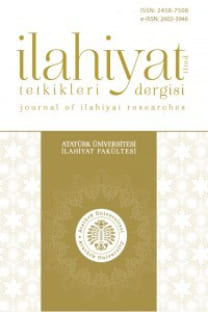KUR’ÂN ÖĞRETİM METOTLARI VE ÖGRETİCİLİK VASIFLARI / The Characteristics of Teachers of Koran and Teaching Methodology
ÖZETAllah katından gönderilmis mukaddes bir Kitap’ın öğreticisi durumunda olan bir kişi, -diğer branş sahibi eğiticilerin yapması gerektiği gibi- kendisini meslegine vermeli ve benimsemelidir. Ayrıca dersteki yeterliliğiyle öğrencilerine güven vermeli, kendisini ve dersini sevdirmelidir.Tarafsız ve demokratik kisiliği ile öğrenciler arasında ayrım yapmamalı, her öğrenciye değer verdiğini hissettirmelidir. Ders ve notu bir baskı aracı olarak kullanmamalıdır. Öğrencilerden gelebilecek bazı olumsuz davranışlara karşı da, oldukça sabırlı,soğukkanlı ve hoşgörülü olmalıdır.Anahtar Kelimeler: Öğrenim-Ögğetim, Metot, Kur'ân, Tecvîd, Ezber ve Düzgün Telaffuz.ABSTRACTAny one who undertakes the teaching of Koran should devote himself to his profession.Her/ His students must have confidence on him and sympathize themselves with their teacher. As a teacher he / she must never discriminate the students, who, in turn, should feel respect for him and have self-confidence. He / she should never use the assessment and evaluation of the exam as a means of oppression on the students. As a teacher, he / she should be patient, cold blooded and tolerant towards the unfavourable or unpleasant attitude or behaviour which may occasionally demonstrated by the students.Key Words: Learning and Teaching, Koran, Tajvid, Learning by Heart and Proper Pronunciation.
Anahtar Kelimeler:
-
- ISSN: 2458-7508
- Yayın Aralığı: 2
- Başlangıç: 1975
- Yayıncı: Atatürk Üniversitesi
